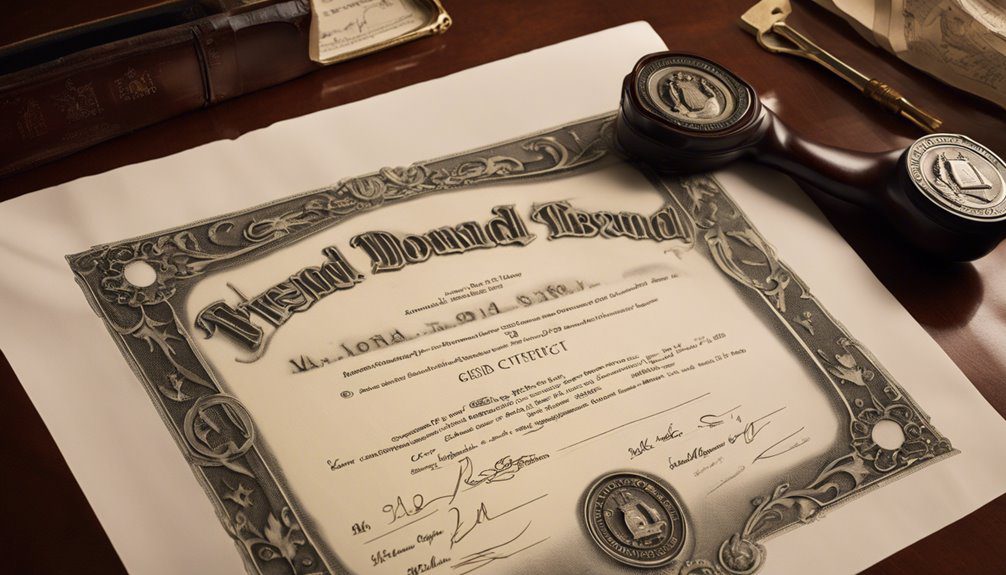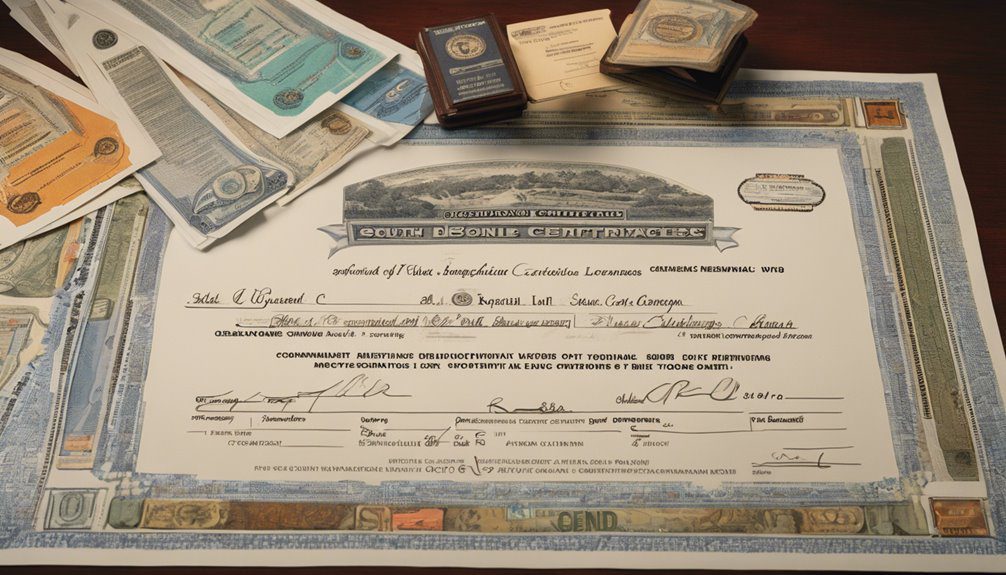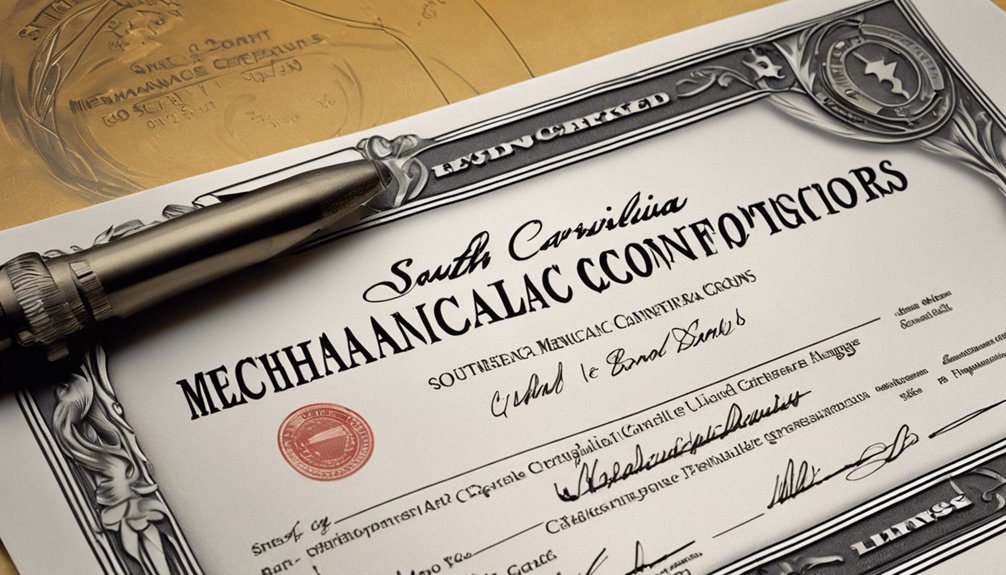If you're a mechanical contractor in South Carolina, understanding the Group 1 Bond and its $7,000 value is crucial for your operations. This bond serves not just as a regulatory requirement but also as a key element in building trust with your clients. You might wonder about the eligibility criteria and the process to secure this bond. Before you proceed, it's important to consider how this bond can impact your business's reputation and marketability. What steps should you take next to ensure compliance and safeguard your interests?
Overview of Group 1 Bond

When it comes to obtaining a South Carolina Mechanical Contractors License, understanding the Group 1 Bond is essential. This bond is specifically designed for contractors who plan to work on projects with a value of $5,000 or more. By obtaining this bond, you're essentially guaranteeing that you'll adhere to state regulations and fulfill your contractual obligations.
The Group 1 Bond is set at a value of $7,000, which means you'll need to pay a premium to secure it. This amount acts as a safety net for clients and the state, ensuring that you can cover any potential claims made against you for failure to perform or adhere to regulations.
It's important to note that this bond isn't just a formality; it plays a crucial role in maintaining your credibility and protecting your business. Additionally, securing a Group 1 Bond can enhance your professional reputation. Clients often feel more secure when they see that you're bonded, as it demonstrates your commitment to quality work. Furthermore, obtaining this bond can help you meet legal and regulatory requirements, which is vital for successful business operations.
Importance of the ,000 Bond
The $7,000 bond is crucial for South Carolina mechanical contractors, serving as a financial guarantee that protects both clients and the state. By obtaining this bond, you demonstrate your commitment to adhering to industry regulations and ethical practices. It assures clients that you'll fulfill your contractual obligations, providing them with peace of mind when they hire you for their projects.
Moreover, this bond acts as a safeguard against potential financial losses. If you fail to meet your responsibilities—whether due to incomplete work, poor workmanship, or other issues—the bond can be claimed against to compensate your clients. This not only protects them but also enhances your reputation as a reliable contractor.
In addition, having a $7,000 bond can open doors for you in the competitive construction market. Clients often prefer contractors who are bonded, as it signifies professionalism and accountability. It shows you're serious about your business and willing to take the necessary steps to protect your clients' interests.
Ultimately, the $7,000 bond isn't just a requirement; it's a vital tool that strengthens your business relationships and builds trust in your services. Furthermore, it is important to note that surety bonds are regulated by the State of Louisiana, ensuring compliance with local laws and regulations.
Eligibility Requirements

To qualify for a $7,000 mechanical contractor bond in South Carolina, you'll need to meet specific eligibility requirements.
First, you must hold a valid mechanical contractor license issued by the South Carolina Department of Labor, Licensing, and Regulation. This ensures that you're recognized as a professional in the field.
Next, you need to demonstrate financial responsibility. This generally involves having a good credit score and a clean financial history. Lenders often review your credit report to assess your reliability. If there are any significant financial issues, it could affect your ability to secure the bond.
Experience also plays a crucial role. You'll need to show that you have relevant work experience in mechanical contracting. This typically means having a specific number of years in the industry, which can vary based on the bond requirements.
Lastly, ensure that you're not facing any legal issues that could jeopardize your bond eligibility. Any prior claims against your license or bond can impact your chances. Additionally, surety bonds are essential for various industries, including mechanical contracting, as they provide financial security for project completion.
Application Process
Navigating the application process for a mechanical contractor bond in South Carolina requires careful preparation and attention to detail.
First, you'll need to gather essential documents, including your business license, proof of insurance, and financial statements. Make sure these documents are up-to-date and accurate, as they'll play a crucial role in your application.
Next, you'll complete the bond application form. This form typically requests information about your business, including its structure, ownership, and operational history. Be honest and thorough in your responses; any discrepancies could delay your application or lead to denial.
Once you've filled out the application, it's time to submit it along with any required fees.
After submission, the bonding company will conduct a review, assessing your credit history and financial stability. This step is vital, as it determines your eligibility for the bond and the premium you'll pay. Additionally, many states do not require credit checks for bonds under $25,000, which may benefit your application process.
Bonding Companies Options

Several bonding companies offer options for mechanical contractors in South Carolina, each with unique terms and conditions. When you're looking for a bonding company, it's important to compare your choices to find the best fit for your needs. Some companies may have more flexible underwriting criteria, which can make it easier for you to secure a bond, while others focus on offering the lowest rates.
You should consider the reputation of each bonding company. Look for companies with positive reviews and a strong track record in the industry. Their financial stability is also crucial, as it ensures they'll be able to fulfill their obligations if needed.
Additionally, think about the customer service you'll receive. A responsive and knowledgeable team can make the bonding process smoother and more efficient. You might also want to check if they offer online services for applications and renewals, which can save you time. Furthermore, understanding the different types of surety bonds available can help you make an informed decision when selecting a bonding company.
Ultimately, by evaluating these factors, you can choose a bonding company that meets your requirements and helps you successfully navigate the licensing process in South Carolina.
Costs and Fees
When choosing a bonding company, understanding the costs and fees associated with obtaining a mechanical contractor license bond in South Carolina is vital. The cost of your bond typically ranges from 1% to 15% of the bond amount, which is $7,000 for Group 1. This means you could pay anywhere from $70 to $1,050, depending on factors like your credit score and financial history.
Most bonding companies will also charge a small processing fee, which varies by provider. It's crucial to ask for a breakdown of all associated fees before committing.
Additionally, some companies might require a collateral deposit, especially if your credit isn't stellar.
You should also consider that some bonding companies offer discounts for long-term contracts or multiple bonds, so it pays to shop around.
Don't hesitate to negotiate terms and ask about any hidden fees. Understanding all these costs upfront will help you budget accordingly and avoid surprises later on.
Ultimately, being informed empowers you to make the best choice for your business needs while ensuring compliance with South Carolina regulations. Moreover, working with an experienced bonding team can streamline the bonding process and provide you with valuable insights.
Duration and Renewal

Understanding the duration and renewal process for your South Carolina mechanical contractor license bond is essential for maintaining compliance. Typically, your bond remains effective for one year from the date of issuance.
It's crucial to keep track of your bond's expiration date to avoid any lapses that could impact your licensing status.
When it comes time for renewal, you'll want to reach out to your bonding company well in advance. They'll guide you through the process, which often involves paying a renewal premium.
This premium may be similar to what you paid initially, but it could vary based on your claims history and creditworthiness. Additionally, the renewal process may require you to demonstrate your ongoing compliance with regulations to ensure continued eligibility for the bond.
Once you've completed the renewal process, ensure you receive a new bond document that reflects the updated expiration date.
Keep this document on file, as you'll need it to demonstrate compliance with state regulations.
Consequences of Non-Compliance
Failing to comply with the requirements of your South Carolina mechanical contractor license bond can lead to serious consequences. You risk losing your license, which can prevent you from legally operating in the state. This can severely impact your business, as you won't be able to take on new projects or complete existing contracts.
Clients may also choose to work with other contractors who are compliant, leaving you with fewer opportunities.
Additionally, if a claim is made against your bond and you don't resolve the issue, the bond company might seek repayment from you. This can create financial strain and damage your credit score.
Furthermore, repeated non-compliance can lead to increased scrutiny from regulatory agencies, resulting in fines or penalties that add to your financial woes.
You may also face legal consequences, as clients or subcontractors could pursue lawsuits if they believe you've failed to meet the obligations tied to your bond.
Ultimately, staying compliant is crucial to maintaining your reputation and ensuring your business thrives in South Carolina's competitive market. Arkansas Surety Bonds emphasize the importance of understanding and adhering to your bonding requirements.
Don't underestimate the importance of understanding and adhering to your bonding requirements.
Tips for Successful Bonding

Successfully navigating the bonding process is essential for any mechanical contractor in South Carolina. To ensure a smooth experience, start by thoroughly understanding the specific bonding requirements for your license category. This knowledge will help you avoid unnecessary delays and complications.
Next, choose a reputable bonding company. Research multiple providers, compare rates, and read reviews to find one that fits your needs. A good bonding agent can guide you through the application process and answer any questions you may have.
Be prepared to provide detailed information about your business, including financial statements, work history, and any relevant licenses. Having organized documentation ready will streamline the application process and demonstrate your professionalism.
Don't overlook your credit score either. A higher score can lead to better bonding rates, so consider improving it before applying.
Lastly, maintain open communication with your bonding agent throughout the process. They can provide updates and help resolve any issues quickly. Additionally, understanding the types of surety bonds required in your state can further enhance your preparation and compliance.
Conclusion
In summary, securing the South Carolina Mechanical Contractors License Group 1 bond is vital for your business if you're tackling projects over $5,000. This bond not only boosts your credibility but also helps you comply with state regulations. By understanding the requirements and processes, you can navigate bonding successfully. Remember, being bonded shows clients you're committed to ethical practices and professionalism, ultimately enhancing your marketability in a competitive field. Don't underestimate its importance!


